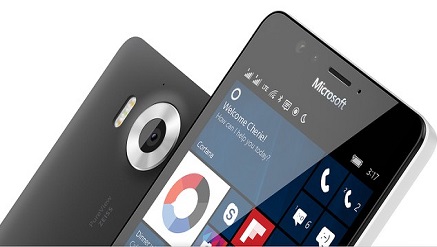Telecom
Windows Phone 2017 Volumes to Decline 80.9%- Report

As worldwide smartphone shipments are expected to rebound slightly in 2017 with expected growth of 3.0% over the previous year, it is all bad news for Windows Phone as Microsoft is yet to get a formidable hardware partner.
Thus, Windows Phone shipments continue to fall and overall enthusiasm for the platform show no immediate signs of recovery.
According to a new forecast from the International Data Corporation (IDC) Worldwide Quarterly Mobile Phone Tracker, in 2016, year-over-year growth was 2.5%, marking the lowest growth the industry has ever experienced.
With several major devices entering the market this year, IDC anticipates shipment volumes will grow to 1.52 billion in 2017.
And IDC expects this momentum to carry into 2018, when smartphone shipments are forecast to grow 4.5% year over year, fueled by improved economic conditions in many emerging markets and a full year of new iPhone shipments from Apple.
“2016 was an interesting year for smartphones with some high-growth markets down and other mature markets like the U.S. and China outpacing global growth rates,” said Ryan Reith, program vice president with IDC’s Worldwide Quarterly Mobile Device Trackers. “Looking ahead, we continue to believe several factors will enable the smartphone market to regain some of its momentum. First and foremost is that less than half the world’s population is currently using a smartphone, and markets like the Middle East & Africa, Central & Eastern Europe, and Southeast Asia still have plenty of room to grow. In addition, as consumers continue to demand more from their smartphones we expect to see a large portion of the installed base that is currently using low-end devices begin to seek a more robust experience on more capable devices. Media consumption, gaming, augmented and virtual reality, and constant connectivity are drivers of this trend.”
The other big topic in the smartphone industry is the intense fight for the high end of the market. Samsung has made a lot of noise with its recent Galaxy S8 and S8+ device launches, further proving that last year’s Note 7 debacle is not going to alter the company’s plans for remaining number one.
And all signs point to late 2017 being one of Apple’s biggest, if not the biggest, product announcements with the highly anticipated next round of iPhones. Despite the massive growth of the low-end smartphone market in the past few years, IDC still fully expects the high-end market will continue to hold its place in the industry.
Advancements in computing, display technology, cameras, and storage will continue to create the need for high-end users to refresh their devices.
“With the ongoing fight at the high end, vendors will need to find a way to innovate ahead of the curve to attract new users and increase shipments while driving profits,” said Anthony Scarsella, research manager with IDC’s Worldwide Quarterly Mobile Phone Tracker. “The display looks like it could be the next battlefield for the smartphone over the next couple years. We have seen both Samsung and LG opt for new borderless 18:9 displays and Apple could be set to join the party later this year. As smartphone owners continue to consume media on their devices, the screen (bigger, brighter, and bolder) will be an integral part of the overall design language for each vendor. From flexible to foldable and everything between, 18:9 displays look to be just the beginning of what’s to come.”
Platform Highlights
Android: The discussion around Android’s share of the smartphone market became irrelevant a few years back when it became clear that devices running Google’s OS would continue to capture roughly 85% of the worldwide smartphone volume.
What is interesting is to look at the many micro-trends going on within the platform. Despite a slew of very attractive high-end Android products, IDC continues to see Android average selling prices (ASPs) decline and expectations are that the 1.5 billion Android phones that ship in 2021 will have a collective ASP of $198.
Looking closer at 2018, the Middle East & Africa region for Android devices is expected to be the fastest growing at 10% year over year, which will well outpace the forecast for worldwide growth of 4.1%.
iOS: Coming off the first year in which iPhone shipments declined, expectations are that 2017 volumes will grow 3.8%. IDC slightly lowered its 2017 projections for Apple in this forecast to 223.6 million, while increasing its 2018 volumes to 240.4 million.
All signs point to late 2017 and certainly 2018 being very strong for Apple as much of its installed base seems ready for a refresh and the next round of iPhones is not likely to disappoint its fans.
Windows Phone: Windows Phone shipments continue to fall as the lack of new hardware partners, developer support, and overall enthusiasm for the platform show no immediate signs of recovery.
IDC expects 2017 volumes to decline 80.9% to just 1.1 million units. Microsoft has yet to fully commit to any “Surface”-style attack for smartphones or to push new vendors to embrace the platform, leaving little hope of mounting a full scaled comeback in the years to come.
Telecom
Glo Unveils Immersive Gaming Experience, Travel Saga

With the introduction of Travel Saga, a premium, fast-paced gaming experience that is currently live and accessible to customers on its network, Globacom has lifted the bar for mobile entertainment in the country.

Travel Saga is a story-driven, intricately connected role-playing game designed to provide the thrill, complexity, and competitive intensity of some of the most well-known action games in the world.
The game, which has been painstakingly optimized for mobile devices, redefines mobile gaming as a full-fledged digital battlefield by translating a console-grade experience onto data-enabled handsets.
Fundamentally, Travel Saga takes users on quick virtual journeys against recognizable international landscapes. In a dynamic, ever-evolving gaming environment, players are thrown into furious missions, fierce fights, and ever-expanding tales where talent, strategy, and endurance determine who rises through the ranks to become a true war hero.
In addition to the excitement of fighting, users are encouraged to go to various locations, take part in thrilling challenges, and participate in intense competition for in-app rewards like points and victory badges. With each encounter and accomplishment, the immersion increases with each level, maintaining momentum and excitement.
Flexible subscription plans with one-time or auto-renewal choices are available to subscribers for the service, which costs ₦100 per day and ₦250 per week. By dialing *70021#, customers can quickly subscribe and gain instant access to the action.
With Travel Saga, Glo reaffirms its dedication to innovation and high-end digital experiences, making top-notch gaming easily accessible to its customers. The game offers uninterrupted action, adventure, and competition, all smoothly supported by the Glo network.
Telecom
SHELT Named in Prestigious 2025 MSSP 250 List for Cybersecurity Excellence

SHELT, a leading cybersecurity-as-a-service provider, has earned inclusion in the 2025 MSSP 250, the annual ranking of the world’s top 250 Managed Security Service Providers (MSSPs) by MSSP Alert, a CyberRisk Alliance publication.

SHELT
The list evaluates firms on business performance, service breadth, and industry impact, spotlighting those excelling in growth, operational excellence, and advanced managed security amid rising cyber threats. Selection criteria include annual recurring revenue, profitability, workforce expansion, business growth, and the depth of managed security offerings.
SHELT’s recognition underscores its investments in scalable security operations, threat intelligence, and tailored managed services across multiple regions, enabling clients to navigate complex risk landscapes effectively.
“Being recognised in the MSSP 250 is a meaningful milestone for our team,” stated Youssef Abillama, CEO of SHELT. “It validates our focus on building practical, resilient security services that help organisations manage risk and respond effectively to today’s evolving cyber threats.”
The company hailed the honour as testament to its teams’ dedication and expertise worldwide, reaffirming commitment to enhancing capabilities and delivering trusted cybersecurity solutions.
Telecom
Meta Names Ex-Trump Adviser Dina Powell McCormick as President

Meta Platforms, owner of Facebook, has appointed Dina Powell McCormick, a former adviser to President Donald Trump, as its new president and vice chairman, bolstering its leadership amid aggressive AI and infrastructure expansion.

Dina Powell McCormick
The announcement, made on Monday, positions Powell McCormick – who recently stepped down from Meta’s board after eight months – to guide overall strategy, including multi-billion-dollar investments in data centres and global partnerships.
A Goldman Sachs veteran with 16 years in senior roles and prior stints as deputy national security adviser under Trump and in the Bush administration, she brings deep finance and international ties to the role.
Meta CEO Mark Zuckerberg hailed her as “uniquely qualified” for the company’s next growth phase, while President Trump praised the move on Truth Social as a “fantastic choice”.
The hire signals Meta’s efforts to strengthen White House relations, following recent dinners with Trump and U.S. investment pledges worth hundreds of billions

 E-Financial2 days ago
E-Financial2 days agoWema Bank Upgrades ALAT Banking App

 General News2 days ago
General News2 days agoFirm Launches AI-powered Platform to Simplify New Tax Laws

 Telecom2 days ago
Telecom2 days agoX Suspends Twitter Account for Rules Violation

 E-Business2 days ago
E-Business2 days agoStudy Reveals 88.5% of Phishing Attacks Focus on Stealing Account Credentials

 General News1 day ago
General News1 day agoPalmPay, Premier Cool to Reward 10,000 Nigerians with ₦100m in “10k for 10k Campaign”

 News2 days ago
News2 days agoNigeria, Others Lag Behind as Egypt Tops Africa in AI Readiness

 E-Financial1 day ago
E-Financial1 day agoEcobank Joins Trillion-naira Club for the First Time in 20 Years

 E-Business1 day ago
E-Business1 day agoKaspersky Warns Telecom Threats from 2025 will Carry into 2026 as New Technology Adds New Risk















